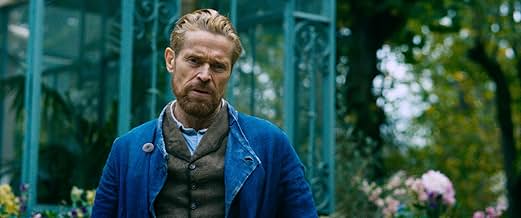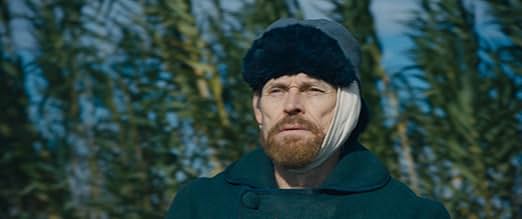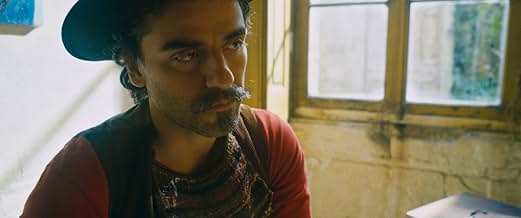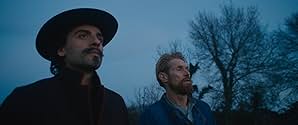Ein Blick auf den Teil des Lebens des Malers Vincent van Gogh, in dem er in Arles und Auvers-sur-Oise (Frankreich) lebte.Ein Blick auf den Teil des Lebens des Malers Vincent van Gogh, in dem er in Arles und Auvers-sur-Oise (Frankreich) lebte.Ein Blick auf den Teil des Lebens des Malers Vincent van Gogh, in dem er in Arles und Auvers-sur-Oise (Frankreich) lebte.
- Regie
- Drehbuch
- Hauptbesetzung
- Für 1 Oscar nominiert
- 3 Gewinne & 16 Nominierungen insgesamt
Clément Paul Lhuaire
- Emile Bernard
- (as Clément Lhuaire)
Alan Aubert
- Albert Aurier
- (as Alan Aubert-Carlin)
- …
Empfohlene Bewertungen
This film succeeds in various ways: Dafoe delivers a marvelous portrayal of van Gogh, and Rupert Friend offers a dignified performance as Theo, his brother. The production design, costuming, and lush landscapes are all outstanding. As someone who has seen most of the films directed by Schnabel, I find him an insightful, astute director, yet I wish he would have introduced more nuance into certain scenes.
The invigorating piano score suffers from an overblown volume at various times. At the pre-release screening, more than a handful of people walked out of the film, midway. I think they were overwhelmed by a dizzy combination of loud music and jumpy, blurred camera techniques. As for me, the approach worked, adding a visceral punch.
Some of the dialogue was culled from Vincent's letters to his brother, and Dafoe rendered the text with a vulnerable immediacy. Several roles were aptly cast, but could have benefited from additional screen time: Isaac (as Gauguin), Almaric (Dr. Gachet), and Seigner (Madame Ginoux).
The invigorating piano score suffers from an overblown volume at various times. At the pre-release screening, more than a handful of people walked out of the film, midway. I think they were overwhelmed by a dizzy combination of loud music and jumpy, blurred camera techniques. As for me, the approach worked, adding a visceral punch.
Some of the dialogue was culled from Vincent's letters to his brother, and Dafoe rendered the text with a vulnerable immediacy. Several roles were aptly cast, but could have benefited from additional screen time: Isaac (as Gauguin), Almaric (Dr. Gachet), and Seigner (Madame Ginoux).
Vincent Van Gogh's last days in the south of France are depicted in this heartfelt drama by Julian Schnabel. Willem Dafoe gives a powerful performance as the destitute, troubled painter who was not understood by those in his own time. As Van Gogh seeks to express his extraordinary eye for nature and portraits, those around him are either put off, wary or sometimes intrigued. His brother is his only real comfort.
A deliberately paced film with a mournful soundtrack, this will leave you in a contemplative state. It does not tell you everything about Van Gogh or when his self-isolation began but it does seek to offer insight into his profoundly troubled mental state. His demons are quite evident throughout the film- everything from his intolerant response to the curiosity of schoolchildren to his difficulty explaining his world to whatever doctor is examining him, Van Gogh is exemplified in Dafoe's anguished face. Schnabel, himself a painter, brings his own perspective in piecing this film together, especially in showing how Van Gogh paints and goes about his craft.
The film is not without drawbacks. Oscar Isaac is miscast as Paul Gauguin, the French painter whom Van Gogh couldn't bear losing company with. And Mads Mikkelsen gets minimal screen time in a very thoughtful performance as an inquisitive priest who recognizes Van Gogh's uniqueness. But this film is Schnabel's interpretation of Van Gogh and Dafoe's exemplary portrayal of him and in that regard it works quite well. Recommended.
A deliberately paced film with a mournful soundtrack, this will leave you in a contemplative state. It does not tell you everything about Van Gogh or when his self-isolation began but it does seek to offer insight into his profoundly troubled mental state. His demons are quite evident throughout the film- everything from his intolerant response to the curiosity of schoolchildren to his difficulty explaining his world to whatever doctor is examining him, Van Gogh is exemplified in Dafoe's anguished face. Schnabel, himself a painter, brings his own perspective in piecing this film together, especially in showing how Van Gogh paints and goes about his craft.
The film is not without drawbacks. Oscar Isaac is miscast as Paul Gauguin, the French painter whom Van Gogh couldn't bear losing company with. And Mads Mikkelsen gets minimal screen time in a very thoughtful performance as an inquisitive priest who recognizes Van Gogh's uniqueness. But this film is Schnabel's interpretation of Van Gogh and Dafoe's exemplary portrayal of him and in that regard it works quite well. Recommended.
This film doesn't follow the Hollywood structure. It's not a biography like you might expect, and the plot isn't defined. Instead, this is an attempt to get inside Van Gogh's head, and a brilliant one at that. Imagine being the world's greatest artist, with zero validation and constant ridicule by the establishment around you. That's the torturous state of being this film encapsulates and does it with purpose. At times, the cinema language gets more experimental than necessarily to accomplish its goal, but I commend the director for pushing the boundaries of standard filmmaking and letting us inhabit Van Gogh's mind for this brief period. I genuinely felt a loss for this escape from my own mind when Van Gogh passed. I recommend anyone involved with artistic or creative thinking to watch this film.
This film tackles the story of an artist creating masterpieces for later generations but not for his own. All the techniques that bothered other reviewers--the handheld camera, loud piano soundtrack, looped dialog--all emphasized a life of loneliness and ridicule that made the audience experience those emotions.
Clearly the story lacked a typical plot, not so much because it wasn't there as much as that Van Gogh's story is so well known and portrayed. I sensed that my companions may have been wishing they had chosen a different movie but for me this film further added to the tapestry of Van Gogh's unique story. Plus the film addresses the two biggest points of contention about him ... his ear and his death ... and suggests that Van Gogh's character traits have turned those into unsolvable mysteries.
Clearly the story lacked a typical plot, not so much because it wasn't there as much as that Van Gogh's story is so well known and portrayed. I sensed that my companions may have been wishing they had chosen a different movie but for me this film further added to the tapestry of Van Gogh's unique story. Plus the film addresses the two biggest points of contention about him ... his ear and his death ... and suggests that Van Gogh's character traits have turned those into unsolvable mysteries.
Loved the raw hand held camera work . The director shows the scene in such a that u can really enter into vincent's mind and can see his vision . Obviously the acting of Willem Dafoe was tremendous and he took the character to another level .
Wusstest du schon
- WissenswertesWillem Dafoe was 62 when the film was released, 25 years older than Vincent van Gogh, who died at age 37.
- PatzerTheo tells Vincent at the hospital that he is now married. In reality Vincent received a letter from his brother on Dec 23rd 1888, in which he announced his engagement. Vincent feared that his brother would not be able to support him, once married. Additional to this he had the argument with Gaugin that night over Paul leaving. Mentally disturbed by all this he cut his ear off.
- Zitate
Vincent Van Gogh: Maybe God made me a painter for people who aren't born yet.
Priest: Possibly.
Vincent Van Gogh: It is said, Life is for sowing. The harvest is not here.
- Crazy CreditsThere's a mid-credits scene, where a Paul Gauguin quote is narrated.
- VerbindungenFeatured in Sven Uslings Bio: 2019 Års sämsta biofilmer (2020)
Top-Auswahl
Melde dich zum Bewerten an und greife auf die Watchlist für personalisierte Empfehlungen zu.
- How long is At Eternity's Gate?Powered by Alexa
Details
- Erscheinungsdatum
- Herkunftsländer
- Offizielle Standorte
- Sprachen
- Auch bekannt als
- Van Gogh en la puerta de la eternidad
- Drehorte
- Produktionsfirmen
- Weitere beteiligte Unternehmen bei IMDbPro anzeigen
Box Office
- Bruttoertrag in den USA und Kanada
- 2.294.915 $
- Eröffnungswochenende in den USA und in Kanada
- 92.856 $
- 18. Nov. 2018
- Weltweiter Bruttoertrag
- 11.519.666 $
- Laufzeit
- 1 Std. 51 Min.(111 min)
- Farbe
- Seitenverhältnis
- 2.35 : 1
Zu dieser Seite beitragen
Bearbeitung vorschlagen oder fehlenden Inhalt hinzufügen




































